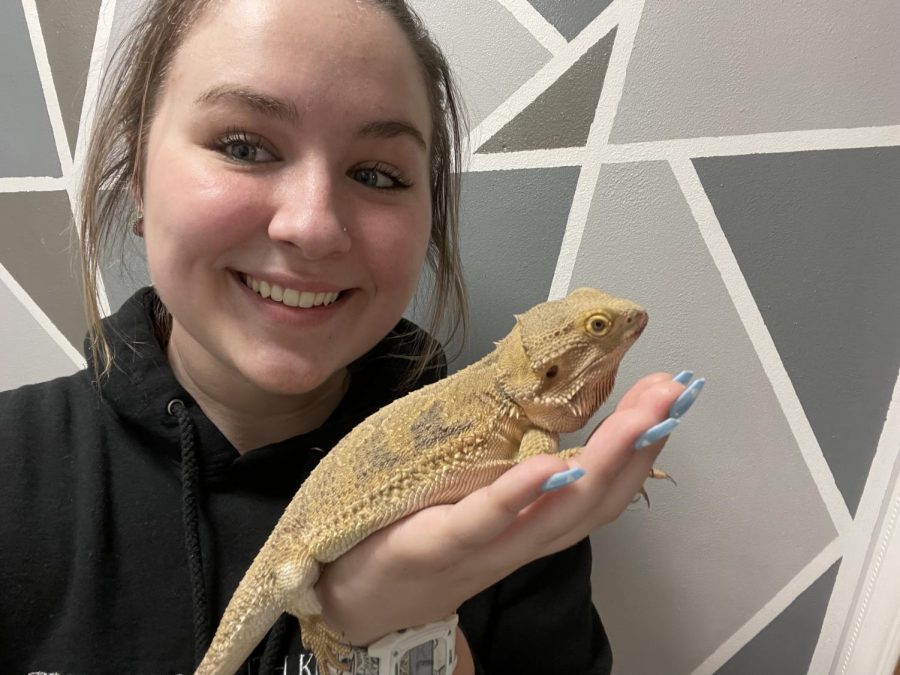Students, faculty adopt pets to keep them company during pandemic
Student Savannah Mulvey, who attends both high school and AACC this semester, holds her adopted lizard, Spike. Like others, she says she finds comfort in having a new pet during the pandemic.
April 20, 2021
Some AACC students and faculty are seeking comfort during the pandemic by adopting pets.
“You’re very sheltered from other people,” Ashley Abate, a second-year homeland security student, said. “It’s been kind of awesome to come home to” her new dog, Rocky, whom she rescued from a shelter.
“We believe he actually came from South Carolina or Georgia … where he was pulled from a rescue and … transported up here to find a home,” said Abate, who lost a cat to heart disease before the pandemic began.
Pets can be comforting in times of stress, Dr. Jarred Jenkins, an assistant professor of psychology, said.
“When you’re not allowed to interact with a lot of other people and you’re supposed to maintain contact with just your household … pets have provided an alternative … social support,” he said.
According to the National Database of Sheltered Animals, Anne Arundel County animal shelters saw more than a 60% increase in pet adoptions in 2020 compared with 2019.
Second-year communications student Audrey Wais adopted her two kittens, Captain and Panda, during the pandemic.
“It’s been a fun experience for me, because I’ve never raised one [from a kitten],” said Wais, who already had another cat, Mike.
Wais said her whole family has benefited from their newly adopted kittens.
“My father actually [has] been struggling with an injury,” she said. “It’s definitely been a beneficial thing for him. He smiles all the time, and he’s so happy with them and honestly … they make us all so happy.”
Likewise, astronomy professor Deborah Levine, who lost custody of her two cats in a divorce during the pandemic, said her newly adopted, 2-year-old, 17-pound cat Pippin “has made a huge difference” since she started teaching from home.
She said she feels less lonely with Pippin in the house.
“He’s super interactive and super affectionate,” she said. “He’s almost a dog-like cat. He will follow me to my … downstairs workspace when I’m teaching.”
Pippin shares Levine with two pet birds.
“Although it might seem that cats and birds are a bad combination, in my experience, dogs and birds actually tend to be worse,” she said. “Cats give you warning before they pounce.”
Savannah Mulvey, a Chesapeake High School student who also takes classes at AACC, cuddles up with Spike, an adopted bearded dragon—a kind of lizard—that she adopted during the first week of quarantine last year.
“I didn’t have anything else to do and I thought it’d be like the perfect time to focus on a pet,” said Mulvey, who will study medical sonography next year.
Mulvey said Spike helped her cope with the stress of the pandemic.
“I didn’t see any of my friends at all,” she said. “I was being really careful. … Most of the time I just spent doing homework … and chilling at home with him.”
But as Mulvey started going out more, she had less time for Spike.
“I spent every single day with him for two weeks,” she said. “Once everything started opening up, I spent less and less time with him. … Before, he would chill on my shoulder and sit there forever. But now when I hold him, he gets all antsy … because I haven’t been able to spend as much time with him.”
Barbara Barnes, the lead instructor of AACC’s veterinary assistant program, said those who adopt pets should consider how their lifestyles might change once the pandemic is over.
“Is that going to impact the experience that the [pet] gets?” she asked. “Remember, it’s not just about you. We want to make sure it’s a good experience for the pet as well.”
Pets can be a great comfort to their owners, especially when they’re lonely, Barnes said.
“Most people enjoy their pets more than they enjoy their family members, to be honest,” she said. “But you want to get the right pet for yourself and family.”
“People who work a lot, they probably wouldn’t want to have a pet that … needs a lot of interaction,” she said.
And anyone who is considering an adoption should understand how much it costs to care for an animal, Barnes advised.
“They definitely need to consider how much time they have to put in to care for pets, and also put into their resources because an exotic pet is going to have a lot of upkeep,” she said. “And the veterinary costs for something that’s exotic are a lot higher.”












